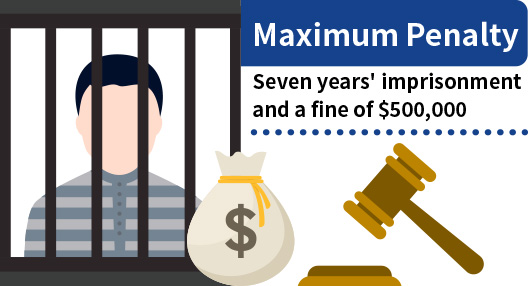Bribery
Bribery
Public servants possess the powers and influence which are not available to ordinary citizens. Hence, public servants must uphold the highest standard of integrity in the discharge of their official duties, and refrain from damaging the interest of the public bodies and the public out of their own interest. To prevent public servants from accepting advantages in their official capacity, Section 4 of the Prevention of Bribery Ordinance (POBO) is in place.
Acceptance of Advantage in Relation to Official Capacity
- Any public servant
- Whether in Hong Kong or elsewhere
- Without written permission from the public body or reasonable excuse
- Solicits or accepts any advantage in relation to his official capacity
- Shall be guilty of an offence
- The offeror of the advantage shall also be guilty of an offence

What is “advantage” ?
“Advantage” includes almost anything which is of value, such as any gift (both of money and in kind), loan, fee, reward, commission, office, employment, contract, service and favour, etc., but excludes “entertainment".

What is “entertainment” ?
“Entertainment” means the provision of food or drink for consumption on the occasion when it is provided, and of any other entertainment connected with or provided at the same time, such as live performance at a banquet. Although the POBO does not prohibit the acceptance of entertainment, public bodies may nevertheless set out guidelines to regulate the acceptance of entertainment by its employees and members.

Points to note
Written permission
If employees and members of public bodies wish to accept any advantages related to their official duties, they must obtain written permission from their public bodies. If such permission is not specified in the code of conduct or any guidelines of the public body, employees and members have to obtain the permission on a case-by-case basis.Giver and acceptor of bribe to be guilty notwithstanding that purpose not carried out
Both the giver and acceptor of bribe are guilty of an offence even if the purpose of the bribe is not carried out. It shall be no defence that the acceptor "did not actually have the power, right or opportunity to do so", "did not intend to do so", or "did not in fact do so”.Customary trade practice not to be a defence
It shall not be a defence to show that any advantage accepted or offered is customary in any profession, trade, vocation or calling. The court shall make the judgment based on whether written permission has been given by the public body.Bribery of public servants by persons having dealings with public bodies

According to
Section 8 of the POBO, any person who, without lawful authority or reasonable excuse, while having dealings of any kind with a public body, offers any advantage to any public servant employed by that public body, shall be guilty of an offence.
Bribery in regard to contracts, tenders and auctions

